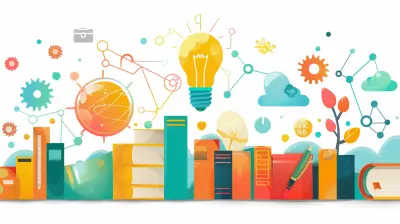Leveraging Technology for Effective Formative Assessment
19 December 2024
In today's fast-paced educational landscape, technology has been nothing short of a game-changer. Gone are the days when traditional pen-and-paper assessments ruled the classroom. Nowadays, educators and students alike are embracing the digital revolution for every aspect of learning, and formative assessment is no exception.
But what exactly is formative assessment? And how is technology making it even more effective? Well, stick around, because we’re about to dive deep into how leveraging technology can completely transform how we track and improve student learning.

What is Formative Assessment?
Before we get into the tech side of things, let’s take a second to clarify what formative assessment actually is. Think of formative assessment as a GPS for learning. Instead of waiting until the end of the unit to check whether students "got it" with a summative test (the final destination), formative assessments are those regular checkpoints along the way.They help teachers ensure students are on track and understand the material before moving on, allowing for timely interventions or adjustments. Formative assessments are low-stakes, meaning the primary goal isn’t to assign grades but to provide ongoing feedback that shapes future learning.
In short, they are designed to monitor student learning in real-time and guide both the teacher and the student to make informed decisions about what comes next.
But here’s the kicker: formative assessments don’t have to be boring quizzes or worksheets. With the integration of technology, these assessments can become dynamic, interactive, and—dare I say it?—even fun!

The Role of Technology in Formative Assessment
Now, you might be thinking, “How can technology make any difference here?” Well, let’s break it down.Technology doesn’t just replace traditional formative assessments; it enhances them. From instant feedback to data-driven insights, the digital tools available today allow for more personalized, efficient, and engaging assessment methods.
Here’s the thing: while formative assessments used to be time-consuming and limited in scope, today’s tech tools allow for instant results. This means teachers can adjust their lessons in real-time, and students can get immediate feedback on their progress. It's like having a personal tutor that never takes a break!
Benefits of Leveraging Technology for Formative Assessment
Let’s talk about the key benefits of using technology for formative assessment:1. Real-Time Feedback
Imagine you’re cooking a new recipe, but instead of waiting until the end to taste the final dish, you get feedback after every step. That’s what real-time feedback in formative assessment feels like. Students don’t have to wait days or weeks to learn how they did on an assignment. Tools like Google Forms, Kahoot!, or Quizizz allow for immediate results, so both teachers and students can see what’s working and what’s not in a flash.
2. Increased Engagement and Interaction
Who said assessments have to be dull? With interactive tools like quizzes, games, and polls, technology can make learning and assessment feel less like a chore and more like an adventure. Platforms like Socrative or Pear Deck turn assessments into interactive experiences where students can actively engage with the material, making learning both fun and educational. And when students are engaged, they’re more likely to retain information and perform better.
3. Personalized Learning
One-size-fits-all teaching doesn’t cut it anymore. Technology provides the flexibility for personalized learning paths, which is a huge advantage in formative assessment. Tools like adaptive learning platforms (e.g., Edpuzzle or IXL) adjust the difficulty of questions based on a student’s performance, ensuring that each student is being challenged at the right level. It’s like having a tailor-made lesson plan for every single student!
4. Data-Driven Insights
Want to know which concepts your students are struggling with? Technology makes it easier than ever to gather, analyze, and interpret data. Tools like Google Classroom, Nearpod, and Seesaw track student performance in a way that’s clear and actionable. This data can then inform future lesson planning, giving teachers the power to address learning gaps before they become a problem. You’ll know exactly where to focus your energy for maximum impact.
5. Time Efficiency for Teachers
Let’s face it—teachers are stretched thin. Between lesson planning, grading, and, you know, actually teaching, there’s not a lot of extra time for developing and assessing formative assessments. Technology can take a lot of that burden off teachers' shoulders. Automated grading, for example, saves a ton of time, allowing educators to focus on what really matters: helping their students learn and grow.
Popular Tech Tools for Formative Assessment
So now that we know how technology can help, let’s take a closer look at some of the most popular tools educators are using for formative assessment today:1. Kahoot!
Kahoot! is an interactive quiz platform that turns assessment into a game. Teachers can create multiple-choice quizzes, and students answer in real-time using their devices. The competitive aspect (complete with leaderboards) can make even the most reluctant learners excited about participating.2. Google Forms
Google Forms is a simple but powerful tool for creating quizzes, surveys, and assessments. The best part? It automatically grades multiple-choice questions, and the results are neatly organized for easy analysis. Plus, it integrates seamlessly with Google Classroom.3. Socrative
Socrative is another real-time assessment tool that offers diverse quiz types, including true/false, short answer, and multiple choice. It provides instant feedback and detailed reports that help teachers track student understanding over time.4. Edpuzzle
Edpuzzle allows teachers to embed questions into videos, turning passive watching into active learning. Students answer questions throughout the video, and teachers can monitor their progress and understanding.5. Nearpod
Nearpod is an interactive classroom tool that allows teachers to create presentations with embedded quizzes, polls, and activities. It’s perfect for keeping students engaged while assessing their comprehension in real-time.6. Flipgrid
Flipgrid is a video discussion platform where students can record short videos to answer prompts or questions. Teachers can assess student understanding by reviewing their responses, and students get a chance to express their thoughts in a more creative, verbal format.
Best Practices for Using Technology in Formative Assessment
Okay, so we’ve covered the benefits and tools, but how do you actually make the most of technology in formative assessment? Here are some best practices to keep in mind:1. Align Assessments with Learning Objectives
This may sound obvious, but make sure your formative assessments are aligned with your learning objectives. If you’re using a tech tool like Quizizz or Google Forms, ensure that the questions are directly tied to the concepts you’re teaching. Technology is great, but it can’t replace good pedagogical practices.2. Use a Variety of Tools
Don’t stick to just one tool. Variety is the spice of life, right? Using different platforms—like a mix of Kahoot! for quizzes, Flipgrid for video responses, and Edpuzzle for interactive videos—keeps things fresh and engaging for students. Plus, different tools can assess different skills.3. Encourage Peer Feedback
Formative assessment isn’t just about the teacher providing feedback. With tools like Google Classroom or Seesaw, students can also give each other feedback, which is a valuable learning experience in itself. Peer review encourages critical thinking and helps students learn from each other.4. Monitor Progress Over Time
One-off assessments are helpful, but the real magic happens when you track progress over time. Use the data from tools like Nearpod or Socrative to monitor student growth and adjust your teaching strategies as needed. This will give you a clearer picture of each student’s journey.5. Make It Fun
Learning doesn’t have to be boring, and neither does formative assessment. Incorporate fun, game-based elements into your assessments wherever possible. Platforms like Kahoot! or Quizizz make it easy to turn assessments into exciting competitions. When students are having fun, they’re more likely to engage and retain what they’ve learned.
Challenges and Considerations
Of course, no tool is perfect. While technology brings many advantages to formative assessment, it’s important to be aware of potential challenges.1. Digital Divide
Not all students have equal access to technology. It’s important to be mindful of this and ensure that no student is left behind due to a lack of devices or internet connectivity. Always have alternative options for students who may face these challenges.
2. Over-Reliance on Technology
While tech tools are fantastic, it’s essential not to become overly reliant on them. Sometimes, a good old-fashioned class discussion or hands-on activity can provide insights that no digital tool can. Balance is key.
3. Data Privacy
When using tech tools, especially those that collect and store student data, it’s crucial to be aware of privacy concerns. Always ensure that the platforms you’re using comply with data protection regulations, such as FERPA or GDPR.
Conclusion
Formative assessment is vital for guiding learning, and with the advancements in technology, it has become more dynamic, insightful, and effective than ever before. By leveraging tools like Kahoot!, Google Forms, and Nearpod, teachers can provide real-time feedback, engage students in meaningful ways, and personalize learning experiences.So, whether you’re a teacher looking to spice up your classroom or a student hoping for more interactive ways to demonstrate your knowledge, embracing technology in formative assessment can open up a world of possibilities. Learning has never been more fun, efficient, or personalized!
all images in this post were generated using AI tools
Category:
Formative AssessmentAuthor:

Zoe McKay
Discussion
rate this article
19 comments
Chelsea Hunter
Embracing technology in formative assessment isn’t optional; it’s essential. The tools at our fingertips can revolutionize feedback and learning. Let’s stop hesitating and start integrating innovative solutions today—our students deserve nothing less.
February 2, 2025 at 12:53 PM

Zoe McKay
Thank you for your insightful comment! I completely agree—embracing technology is crucial for enhancing formative assessment and providing meaningful feedback to students. Let’s keep pushing for innovation in our educational practices!
Felix McVey
Great insights! Embracing technology in formative assessment truly enhances student engagement and feedback effectiveness in today's classrooms.
January 27, 2025 at 5:27 AM

Zoe McKay
Thank you! I'm glad you found the insights valuable. Embracing technology really does transform the assessment landscape!
Astraea Alvarez
Harnessing technology in formative assessment can transform learning experiences. By providing timely feedback and fostering engagement, educators can better understand student needs, adapt instruction, and promote a growth mindset. Embracing these tools not only enhances learning but also nurtures a culture of continuous improvement.
January 24, 2025 at 4:19 AM

Zoe McKay
Thank you for your insightful comment! I completely agree that technology in formative assessment plays a crucial role in enhancing learning and fostering a growth mindset.
Zane Walker
This article astutely highlights how technology enhances formative assessment, providing educators with innovative tools to gauge student understanding and adapt instruction for improved learning outcomes.
January 21, 2025 at 8:29 PM

Zoe McKay
Thank you for your thoughtful comment! I'm glad you found the article highlights on technology's role in formative assessment valuable for enhancing teaching and learning outcomes.
Patrick McKittrick
Great insights! Excited to embrace technology in assessment!
January 18, 2025 at 9:40 PM

Zoe McKay
Thank you! I'm thrilled to hear you're excited about embracing technology in assessments!
Shiloh Curry
This article brilliantly highlights the transformative role of technology in formative assessment, emphasizing its potential to enhance feedback, engagement, and personalized learning. A must-read for educators seeking innovation in assessment practices!
January 17, 2025 at 5:53 AM

Zoe McKay
Thank you for your kind words! I'm glad you found the article valuable for enhancing assessment practices.
Amber Nguyen
This article provides valuable insights on using technology to enhance formative assessment, making learning more engaging and effective.
January 14, 2025 at 8:30 PM

Zoe McKay
Thank you for your positive feedback! I'm glad you found the insights valuable for enhancing formative assessment.
Alexia Scott
This article piques my interest! How can we best balance technology and traditional methods in formative assessment? I'm curious about specific tools or platforms that have shown measurable success. Also, what strategies can educators employ to ensure that technology enhances, rather than complicates, the assessment process?
January 8, 2025 at 1:31 PM

Zoe McKay
Thank you for your interest! To balance technology and traditional methods in formative assessment, consider using tools like Google Forms for real-time feedback and Padlet for collaborative discussions. Strategies to enhance the assessment process include setting clear objectives, providing training for educators, and integrating tech gradually to ensure ease of use.
Nadine Harris
Great insights on integrating technology in formative assessments! It really highlights how tech can enhance student engagement and learning outcomes.
January 3, 2025 at 12:39 PM

Zoe McKay
Thank you! I'm glad you found the insights valuable. Technology truly has the potential to transform formative assessments and boost student engagement.
Darius Pratt
Technology transforms formative assessment by providing real-time feedback, fostering personalized learning experiences, and enhancing student engagement. Effective use of digital tools not only streamlines assessment processes but also empowers educators to respond dynamically to student needs, ultimately creating a more inclusive and responsive learning environment that supports continuous growth and development.
December 29, 2024 at 8:30 PM

Zoe McKay
Thank you for your insightful comment! I completely agree that technology is pivotal in enhancing formative assessment by enabling real-time feedback and personalized learning, ultimately fostering a more inclusive and adaptive educational environment.
Dominic McKee
Great insights on tech integration!
December 27, 2024 at 3:19 AM

Zoe McKay
Thank you! I'm glad you found the insights helpful!
Zayla McKeever
Great insights on using technology for formative assessment! Embracing these tools can truly enhance learning experiences and foster student engagement. Keep up the fantastic work!
December 25, 2024 at 3:37 AM

Zoe McKay
Thank you for your kind words! I'm glad you found the insights valuable for enhancing learning and engagement.
Edith McElhinney
Integrating technology in formative assessment fosters immediate feedback, enhances engagement, and enables tailored learning experiences, paving the way for continuous student growth and understanding.
December 24, 2024 at 11:55 AM

Zoe McKay
Thank you for highlighting the key benefits of technology in formative assessment! Your insights on immediate feedback and tailored learning are essential for fostering student growth.
Issac McDougal
Exploring technology's role in formative assessment enhances learning, but balance with human interaction is vital.
December 23, 2024 at 9:40 PM

Zoe McKay
Thank you for your insightful comment! I completely agree—while technology can greatly enhance formative assessment, maintaining human interaction is essential for a holistic learning experience.
Lyra McIlroy
Great insights! Embracing technology for formative assessments can transform learning experiences. It's like having a secret weapon in our teaching toolkit! Let’s keep exploring these innovative tools to make learning engaging and effective for everyone. Keep shining! 🌟
December 22, 2024 at 12:30 PM

Zoe McKay
Thank you! I completely agree—technology truly enhances our ability to engage and assess learners effectively. Let's continue to innovate together! 🌟
Caitlin Pruitt
Formative assessment without tech? That’s like using a flip phone in a smartphone world—outdated and totally missing the point!
December 21, 2024 at 5:36 AM

Zoe McKay
I appreciate your perspective! While technology enhances formative assessment, effective strategies can still be implemented without it. The key is always prioritizing student learning.
Diesel Velez
Integrating tech enhances real-time feedback, empowering educators and engaging students effectively.
December 20, 2024 at 9:41 PM

Zoe McKay
Thank you for your insightful comment! I completely agree that integrating technology is crucial for fostering real-time feedback and engaging students in the learning process.
Jemima McInnes
Technology isn't just a tool; it’s the compass guiding formative assessment. When harnessed wisely, it transforms feedback into a dynamic dialogue, enriching learning experiences and empowering both educators and students alike.
December 20, 2024 at 1:50 PM

Zoe McKay
Thank you for highlighting the pivotal role of technology in formative assessment! Your insights on its ability to foster dynamic dialogue and enrich learning experiences resonate deeply with our vision.
Greta Hall
Tech tools: because 'winging it' is so last year!
December 19, 2024 at 3:20 AM

Zoe McKay
Absolutely! Embracing tech tools enhances the assessment process, making it more structured and effective than ever before.
MORE POSTS

The Importance of the Magna Carta in Shaping Rights

The Role of Leadership in Building Inclusive School Cultures

Supporting Project-Based Learning at Home

The Importance of Word Choice in Effective Writing

Supporting Gifted English Language Learners in the Classroom

Storytelling Techniques for Nonfiction Writing

Mastering the Art of Persuasive Writing

How to Identify Twice-Exceptional Students in Gifted Education

How to Use Data Analytics for Virtual Classroom Success

Leadership in Times of Crisis: Guiding Schools Through Uncertainty

Student Housing Abroad: How to Choose the Best Accommodation

The Art of Writing a Thesis Statement